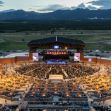Music producer and Bleachers frontman Jack Antonoff has voiced strong criticism of recent remarks made by Live Nation CEO Michael Rapino, who suggested that concert tickets remain “underpriced” and have significant room for price increases.
Antonoff, who has long been outspoken about the live music economy and its impact on fans, took to X (formerly Twitter) on Thursday, Sept. 25, to respond. “This really breaks my heart and is a sick way of looking at it,” he wrote, directly referencing Rapino’s comments from the CNBC and Boardroom “Game Plan” conference last week.
At the event, Rapino compared the cost of attending concerts with the price of tickets for professional sports. He argued that music remains “underappreciated” in the market, pointing out that the average concert ticket currently sells for around $72. “Try going to a Laker game for that,” Rapino said. “The concert is underpriced, and has been for a long time. We have a lot of runway left.”
His framing implied that concertgoers could and perhaps should expect to pay more in the future, a message that clashed with growing frustration among fans who already feel priced out of live music due to fees and resale markups.
Antonoff fired back at Rapino’s reasoning, calling it out as fundamentally dismissive of fans’ lived reality. His main point of contention was not just the initial ticket prices, but how the resale market inflates them beyond recognition. “Answer is simple: Selling a ticket for more than its face value should be illegal,” Antonoff declared. “Then there is no chaos and you give us back the control instead of creating a bizarre free market of confusion amongst the audience who we love and care for.”
He emphasized that he and his team regularly discuss these challenges and try to find ways to mitigate them, but insisted that meaningful change requires systemic action. “It could all be so easy if the people up top didn’t see the audience as a faceless group to extort money from,” he added.
Rapino’s comments came at a precarious time for Live Nation and its subsidiary, Ticketmaster. Just one day after his appearance, the Federal Trade Commission announced a lawsuit against the companies, accusing them of “illegal practices that injure artists, cause consumers to pay significantly more for event tickets, and benefit Defendant’s bottom line.”
The FTC complaint alleges that Ticketmaster withholds fees until late in the checkout process, enables brokers to exceed artist-imposed purchase limits, and permits scalpers to acquire vast quantities of tickets, only to resell them at steep markups, often through Ticketmaster’s own resale platform.
This is not the only legal battle facing the ticketing giant. Live Nation is also the subject of an antitrust suit filed by the Department of Justice, which argues that the company operates as a monopoly in the live events industry. Live Nation has denied those claims, but the litigation remains ongoing.
Antonoff’s public statement highlights a broader rift between artists and the corporate entities that dominate live entertainment. For musicians, especially those who maintain a close connection with their fan base, soaring ticket costs threaten to erode the trust and community they’ve built.
The debate also taps into a cultural moment where the affordability of live experiences has become a flashpoint. With the live music business rebounding post-pandemic, the combination of dynamic pricing models, hidden fees, and aggressive resale markets has fueled resentment among fans who see live music becoming increasingly inaccessible.
Antonoff’s call to outlaw ticket resale above face value is not new; similar proposals have circulated in both political and industry circles for years. But with the FTC and DOJ both turning their attention toward Live Nation and Ticketmaster, his comments add another prominent artist voice to a mounting chorus demanding reform.
As of press time, Live Nation has not issued a response to Antonoff’s remarks.






